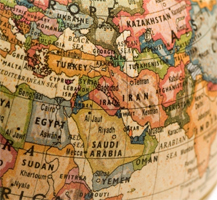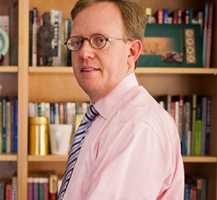Fravel Awarded Carnegie Fellowship
by Peter Dizikes, MIT News Office | Originally published here
MIT political scientist Taylor Fravel has been named to the Andrew Carnegie Fellows Program for the 2016-17 academic year, a prestigious award he will use to extend his studies of Asia's ongoing maritime disputes.
Fravel told MIT News he was "thrilled, humbled, and honored" to be receiving the fellowship, which is worth up to $200,000. The award, announced today by the Carnegie Corporation of New York, supports "research and writing aimed at addressing some of the world's most urgent challenges to U.S. democracy and international order," and focuses on scholars in the social sciences and humanities.
"It is tremendous to have this opportunity to research and write," says Fravel, who will be on leave from MIT during the forthcoming year. Fravel is an expert on China's military strategy and the country's post-World War II history of conflict resolution. His first book, "Strong Borders, Secure Nation: Cooperation and Conflict in China's Territorial Disputes," published by Princeton University Press in 2008, scrutinizes 23 postwar territorial conflicts China has been involved in, and concludes that much of the time—in 17 of those cases—China made territorial concessions in agreements that helped it achieve other goals.
His second book, "Active Defense: Explaining the Evolution of China's Military Strategy," will take a wide-ranging look at many aspects of Chinese defense strategy in the postwar era. It is also under advance contract with Princeton University Press.
"Broadly speaking, my research looks at the causes of conflict, especially those involving China," Fravel says. He is an associate professor in MIT's Department of Political Science and a member of MIT's Security Studies Program.
The Carnegie fellowship will enable Fravel to pursue a new project in which he will look in more detail at the maritime disputes that have emerged in Asia over the last several years. China has been at odds with other countries over territorial claims to a series of small islands—including the Spratly Islands in the South China Sea, also claimed in whole or in part by Vietnam, Taiwan, the Philippines, Malaysia, and Brunei.
"Since the first book came out, China's [maritime] disputes have become much more active," says Fravel, who adds he will be "trying to put those events in a broader context."
Modest as the stakes over the islands might seem on the surface, they are intertwined with larger political dynamics in the region. For this reason and others, Fravel's expertise has been in increasing demand recently, among scholars, policymakers, and other foreign-policy professionals. Fravel says more time for research will enable him to better "survey and examine the various conflict management tools that can help prevent escalation" of these disputes. Those tools potentially include international arbitration, codes of conduct among claimants in the disputes, and arms-control-style agreements among countries to limit activities such as troop deployments.
"The idea is to explore them in more detail," Fravel says.
Fravel received his BA in history from Middlebury College. He earned two master's degrees: one from Oxford University in philosophy, politics, and economics, and one from the London School of Economics in international relations. Fravel earned his PhD in political science from Stanford University in 2004. He has been a member of the MIT faculty since 2004.
Bustani Middle East Seminar Turns 30
By Dain Goulding

The Emile Bustani Middle East Seminar at MIT is celebrating its 30th anniversary this academic year. For the spring semester, the seminar included two lectures on contemporary Middle East affairs.
On March 1, Lebanese author Elias Khoury read a selection from his newest novel, Broken Mirrors: Sinalcol, and discussed modern Lebanon's historic encounter with violence as well as the nation's literary scene and the representation of Lebanese and Arab society in literature. Copies of Khoury's book will be available for sale after the reading and discussion.
On March 15, Bernard A. Haykel, professor of Near Eastern studies at Princeton University, discussed Saudi Arabia and the Politics of Islamic Militancy, examining the concept of Salafism and the role of the Saudi government.
The Bustani Seminar is funded by Myrna Bustani of Beirut, Lebanon, in memory of her father, Emile M. Bustani, who received an SB in civil engineering from MIT in 1933. Emile Bustani headed the leading engineering and contracting firm in the Arab world and was a prominent Lebanese statesman until his untimely death in 1963.
Ford International Professor of History and Associate Provost Philip S. Khoury has chaired the Bustani Seminar for three decades. "We are so grateful to Myrna Bustani and her family for enabling us to host at MIT some of the world's leading scholars and commentators on the contemporary Middle East," Professor Khoury says. "It has become one of the leading university forums in the U.S. for discussion and debate on the politics and culture of that conflicted region."
MISTI Global Seed Funds Winners
by Caroline Knox
Since 2008, the Global Seed Funds Program (GSF) has funded more than 530 faculty-led projects in over 70 countries. From engineering medical diagnostic devices in Mexico to exploring science, technology, engineering, and mathematics (STEM) education in Israel to building the framework for a self-sustaining community of electricity prosumers in Italy, GSF funds projects that confront worldwide challenges and educate future global leaders.
This January the program awarded $2,006,906 to MIT faculty to cover international travel, meeting, and workshop costs. Managed by MIT International Science and Technology Initiatives (MISTI), the GSF enables participating MIT teams to partner with international peers with the goal of developing and launching joint projects. Many of the joint projects lead to publications, additional grant awards and the development of valuable long-term relationships between international researchers and MIT faculty and students. Applicants are encouraged to include MIT undergraduate and graduate students in their projects.
In the 2015-2016 grant cycle, 86 projects—out of 214 applications—were awarded funding by MISTI GSF. This cycle's winning faculty and research scientists represent four MIT schools and 22 departments across the Institute. MISTI GSF consists of a general pool of funds for projects in any country and several country-specific funds. In the latest grant cycle, MISTI supported collaborations in 24 unique countries through 21 individual MISTI seed funds, including the newest funds: MIT-Brazil Lemann Seed Fund for Collaborative Projects, MIT-Germany–University of Stuttgart Seed Fund, MIT-Israel Seed Fund, and MIT-Peru Seed Fund. Click to see this year's GSF grantees.
The MIT-Imperial College London Seed Fund, administered by MISTI, was also launched this year through a partnership between the MIT Office of the Provost and Imperial College London. The MIT-Imperial College Seed Fund primarily supports travel costs for exchange between teams at MIT and Imperial College London, and grants range between $30,000 and $50,000 for an 18-month project period. Winners will be announced on the MISTI site in mid-March.
The next MISTI GSF call for proposals will be announced in May 2016 with a proposal deadline in early fall. Additional details are available on the MISTI website. To read more about GSF projects, visit student and faculty "Notes from the Field."
The Global Seed Funds Program is an initiative within MISTI, MIT's flagship international education program and a part of the MIT School of Humanities, Arts, and Social Sciences (MIT-SHASS). Each year MISTI places more than 800 students with internship, teaching, and research opportunities in over 19 countries.




